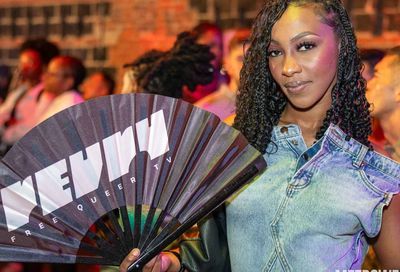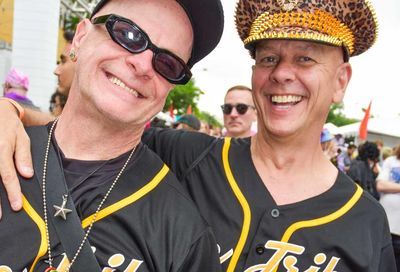‘And Then We Danced’ review: Gay coming-of-age drama finds tender romance amid tense competition
Two male dancers competing for a role can't keep their hands off each other in Levan Akin's "And Then We Danced"

Levan Gelbakhiani marks an impressive film debut starring in And Then We Danced (★★★☆☆), a well-crafted tale of two company members in the National Georgian Dance Ensemble who become competitors, then partners, then lovers. As fresh-faced junior ensemble member Merab, Gelbakhiani is quiet yet intense, and, no surprise, he vividly expresses emotion with his entire body. Even tracking him from behind, the camera picks up on the joy in his stride, or the dejection sinking his shoulders.
And he dances brilliantly, whether boldly throwing himself into a make-or-break audition, or simply losing himself on the dance floor at a club. Director Levan Akin, born in Sweden to immigrant Georgian parents, keeps the camera in fluid motion, a partner in the dance of Merab’s life. All the handheld camerawork can occasionally distract from vital moments of stillness, but Akin’s astute direction and Gelbakhiani’s charismatic performance maintain a steady focus for the tender drama, the Swedish entry for best international feature at this year’s Academy Awards.

Set in the mostly unfamiliar milieu of traditional Georgian folk dancers living and training in metropolitan Tbilisi, And Then We Danced doesn’t set out to break the increasingly familiar mold of a certain type of queer romance. The protagonists might be swimmers or soccer players, cops or farmers, or fellow history buffs whiling away the summer in an Italian villa. For the sensitive male ingenue, something strange and exciting is ignited with the unexpected arrival of the usually more rugged Tom, Dick, or Harry in the picture.
In this case, the new guy is Irakli (Bachi Valishvili), a rakish charmer who shows up wearing his rebellion with the same casual air that he dons his hoop earring and leather jacket. The ensemble’s rigid rehearsal director Aleko (a very effective Kakha Gogidze) immediately orders Irakli to lose the earring, but with or without it, he radiates a rough allure that has Merab enthralled the moment this replacement dancer steps through the door. Unfortunately for Merab’s spot in the ensemble, Aleko also sees the new guy’s appeal as a dancer more suited than Merab to the hyper-masculine style the company demands of its male dancers. With a role in the company’s main ensemble on the line, Aleko pits lithe Merab and strapping Irakli against each other to prove who’s more worthy of representing “the spirit of our nation.”
While the battle for that lead spot remains fairly suspenseful up to the very end, the budding attraction between Merab and Irakli clearly is headed in only one direction. Despite Irakli falling easily into the macho, hard-drinking crew of Merab’s irresponsible brother David (Giorgi Tsereteli), the pair’s secret passion won’t be denied. Even Merab’s girlfriend and lifelong dance partner Mary (Ana Javakishvili) can see what’s coming, though only up to a point. Javakishvili limns a touching portrayal of a smart girl who catches on sooner than lovestruck Merab, though she’s inexperienced too. She and especially Gelbakhiani make their characters’ innocence credible and endearing. That’s the key to these coming-of-age romances, watching innocence rush headlong into a danger we in the audience see spelled out in the bold, bright signs of past experience.
The film also succeeds by immersing us in the details of the dancers’ practice of training, trial and error, their physical exertion playing out in dynamic fashion both as art and competition, and sometimes youthful abandon. Dancing along with Merab and company to the pulsating traditional percussion inside the rehearsal studio, or watching them fall into a joyful pile to the disco strains of Abba’s “Take a Chance on Me,” And Then We Danced transmits weighty emotions through music and movement. Akin’s dialogue carves an intriguing world of class, politics, and toxic masculinity from the film’s depiction of contemporary Georgia, but the story works a kind of magic in its wordless passages. And in Gelbakhiani, the movie has an ideal silent actor whose wide-open face speaks volumes, and who, with the flick of his finger or the turn of his ankle, can convey the power of a young dancer discovering and delivering his talent.
And Then We Danced is not rated, and opens Friday, Feb. 21 at Landmark’s E Street Cinemas. Visit www.landmarktheatres.com/washington-d-c.
Support Metro Weekly’s Journalism
These are challenging times for news organizations. And yet it’s crucial we stay active and provide vital resources and information to both our local readers and the world. So won’t you please take a moment and consider supporting Metro Weekly with a membership? For as little as $5 a month, you can help ensure Metro Weekly magazine and MetroWeekly.com remain free, viable resources as we provide the best, most diverse, culturally-resonant LGBTQ coverage in both the D.C. region and around the world. Memberships come with exclusive perks and discounts, your own personal digital delivery of each week’s magazine (and an archive), access to our Member's Lounge when it launches this fall, and exclusive members-only items like Metro Weekly Membership Mugs and Tote Bags! Check out all our membership levels here and please join us today!



























You must be logged in to post a comment.